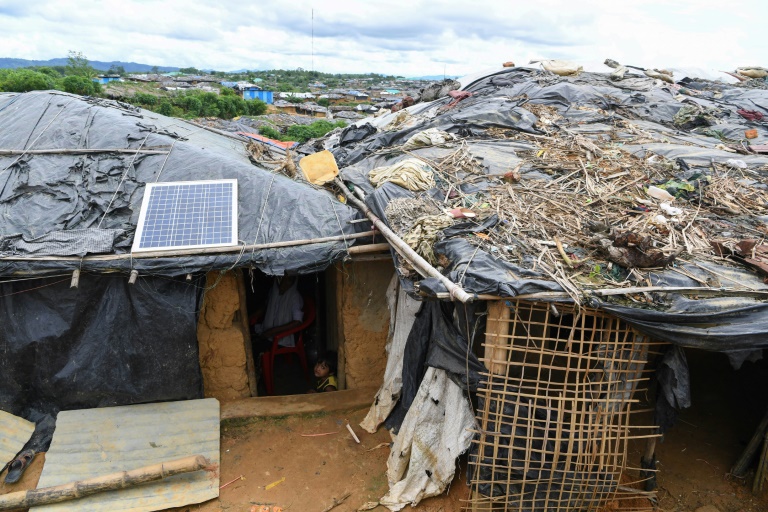The squalid camps in Bangladesh that are now home to nearly 600,000 newly arrived Rohingya have no running water and barely any toilets, but they do have power -- thanks to a proliferation of solar panels.
That means refugees can charge their phones and power electric lights and fans, a lifeline in tents that become baking hot in the strong sun.
Some of the refugees say the panels were among the few precious possessions they grabbed as they fled villages in Myanmar that have been burned to the ground in a campaign of retribution following militant attacks on police posts.
Others have used their meagre resources to buy them after arriving in Bangladesh, where they have had to set up home in the overcrowded refugee camps near the border.
At the entrance to the Balukhali camp, one of the ubiquitous blue panels powers Kabir Ahmed’s makeshift grocery store.
The 46-year-old, who worked in a shrimp farm in his native Myanmar, set up his small business when he arrived in Bangladesh at the start of August after fleeing a military crackdown in Myanmar that the United Nations has said amounts to ethnic cleansing.
He gets enough power from the sun to run four lightbulbs and two small fans.
“Now we can have light at night, and when it’s really hot the fan gives us a bit of relief,” he told AFP as he wiped the sweat from his body with a cloth.
– Solar only power source –
In the absence of mains electricity, the sun is a precious source of energy for the Rohingya now living in camps, where even food and clean water are hard to come by.

In the absence of mains electricity, the sun is a precious source of energy for the Rohingya now living in camps, where even food and clean water are hard to come by
But many villages in the isolated and under-developed northern part of Myanmar’s Rakhine state where the refugees have travelled from also lacked access to mains power.
The refugees AFP spoke to accused mainly Buddhist Myanmar of being unwilling to invest in areas inhabited by the Rohingya, a Muslim minority that the government regards as illegal immigrants.
In fact it is not just the Rohingya — 50 percent of the population of Myanmar lacks access to mains electricity.
Solar power was “the only source of electricity in the area,” said Anwar Sadeq, one of Kabir’s sons, as he minded the store selling sweets and baskets of dried fish.
The family left Rakhine in such a hurry they had to leave their 20-watt solar panel behind, but they have bought a bigger one in Bangladesh.
On cloudy days, they put out the lights early to save enough energy to run the fans through the night.
A handful of power points in tents, served by long electricity cables, are available for the 582,000 Rohingya the UN estimates have arrived in Bangladesh since an upsurge in violence on August 25.
Kabir and his family recharge their phone batteries at a nearby market at a cost of 30 taka (36 US cents).
But not all of the refugees have the money to do that and most cook on firewood and use little if any electricity.
In the neighbouring Kutupalong camp, Anwara Begum has placed her miniature solar panel on a brick in the middle of an alleyway to absorb as much sun as possible.
The panel is connected to a small battery powering a mobile charger and a small bedside light.
In a place where the sun sets at 5:30pm, that means the refugees don’t have to eat their dinner in the dark, said the 30-year-old, who arrived in Bangladesh at the beginning of last month.
But after barely an hour, the light goes out, plunging the tent once again into darkness.






